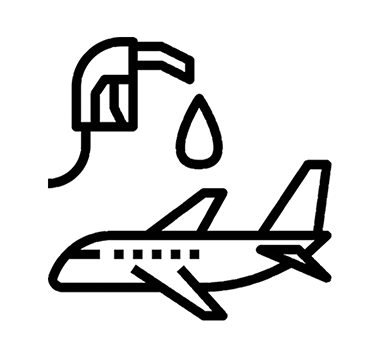Aviation fuel is not just a simple mixture of hydrocarbons. It is a carefully engineered and refined product that plays a critical role in the safe and efficient operation of aircraft. To meet the demanding requirements of modern aviation, various additives are incorporated into aviation fuel. In this blog post, we’ll explore the important role of additives in enhancing aviation fuel performance.
The Basics of Aviation Fuel
Aviation fuel, also known as jet fuel, is a specialized type of fuel designed for use in aircraft with gas turbine engines. These engines, commonly referred to as jet engines, operate on the principles of compressing and combusting air and fuel to produce thrust. The fuel must meet specific quality and safety standards to ensure the reliable operation of these engines.
Aviation fuel is primarily composed of hydrocarbons, which are molecules containing carbon and hydrogen atoms. The chemical composition of jet fuel includes alkanes, aromatics, and naphthenes. These hydrocarbons contribute to the fuel’s energy content and combustion characteristics.
Challenges in Aviation Fuel
Aviation fuel faces several challenges, particularly in terms of performance and safety. The demands placed on aviation fuel are unique due to the extreme conditions experienced during flight. Key challenges include:
Energy Density – Aviation fuel must have a high energy density to provide the necessary power for flight while keeping fuel volume and weight to a minimum.
Safety – Jet fuel must have a high flash point, which is the lowest temperature at which it can ignite, to reduce the risk of fire hazards during handling and storage.
Freezing Point – The freezing point of jet fuel is crucial to prevent fuel system blockages at high altitudes where temperatures can drop significantly.
Density – Fuel density affects aircraft performance, and higher-density fuels can lead to increased range. However, excessive density can lead to engine performance issues.
Corrosion Control – Jet fuel must be free of contaminants and impurities that could corrode aircraft fuel systems. Preventing the buildup of water in the fuel is particularly important to avoid microbial contamination.
To address these challenges, additives are incorporated into aviation fuel to enhance its performance and safety.
The Role of Additives
Additives are specialized chemicals or compounds that are mixed with aviation fuel to improve its properties and characteristics. They play a crucial role in meeting the specific requirements of aviation fuel. Here are some of the key additives used in aviation fuel and their roles:
Anti-icing Additives – One of the critical challenges in aviation is the prevention of fuel system blockages due to ice formation at high altitudes. To address this issue, anti-icing additives are included in jet fuel. These additives lower the freezing point of the fuel, preventing ice crystals from forming and blocking fuel lines and filters.
Anti-icing additives are essential for ensuring the smooth and continuous flow of fuel to the engines, even in extremely cold conditions. They contribute to the safety and reliability of aircraft operations.
Static Dissipator Additives – Jet fuel can accumulate static electricity during the refueling process, which poses a risk of ignition. Static dissipator additives are used to reduce the buildup of static electricity by enhancing the fuel’s electrical conductivity. By dissipating static charges, these additives help prevent potential hazards during refueling and storage.
Static dissipator additives are especially important when handling aviation fuel in environments where static electricity buildup is more likely, such as in dry and low-humidity conditions.
Fuel System Icing Inhibitors – In addition to preventing ice formation in the fuel itself, aviation fuel also needs protection against ice formation within the aircraft’s fuel system. Fuel system icing inhibitors are added to the fuel to prevent ice from forming on the internal components of the aircraft’s fuel system, such as fuel lines, pumps, and filters.
These additives work by disrupting the process of ice nucleation and growth within the fuel system, ensuring the safe and efficient operation of the aircraft’s engines.
Corrosion Inhibitors – Aircraft fuel systems are vulnerable to corrosion from water and other impurities that can enter the system. Corrosion inhibitors are added to aviation fuel to protect fuel system components from deterioration and rust.
These inhibitors form a protective layer on the metal surfaces within the fuel system, preventing the corrosive effects of water and contaminants. Corrosion inhibitors are essential for extending the lifespan of fuel system components and ensuring the safety and reliability of aircraft.
Metal Deactivators – Jet fuel can come into contact with various metals, including those in fuel system components. The presence of trace metals in fuel can promote the formation of deposits and gum in the fuel, potentially leading to engine fouling. Metal deactivators are used to neutralize the effects of these trace metals and prevent deposit formation.
By inhibiting the catalytic effects of trace metals, metal deactivators help maintain the cleanliness and performance of the fuel and ensure the longevity of the aircraft’s engines.
Lubricity Improvers – Jet engines have highly precise and intricate components that require adequate lubrication to prevent wear and damage. However, aviation fuel lacks the lubricity found in other lubricants. Lubricity improvers are additives that enhance the lubricating properties of jet fuel, reducing friction and wear on engine components.
These additives are essential for ensuring the longevity and performance of aircraft engines, particularly in high-stress conditions.
Biocides – Jet engines can be susceptible to microbial contamination. Microorganisms, such as bacteria and fungi, can grow in the water that accumulates in fuel tanks or fuel storage facilities. This microbial contamination can lead to clogging, fouling, and deterioration of fuel system components.
Biocides are added to aviation fuel to prevent the growth of microorganisms. These additives inhibit the development of bacteria and fungi, keeping the fuel system clean and free from microbial contamination.
Octane and Cetane Boosters – The performance of aviation engines depends on the combustion characteristics of the fuel. For piston engines, aviation gasoline may require octane boosters to enhance resistance to knocking or detonation. Jet fuel, on the other hand, is designed for gas turbine engines and often requires cetane boosters to improve ignition characteristics.
Octane and cetane boosters are additives that optimize the combustion properties of the fuel, ensuring efficient and reliable engine operation.
Stability Improvers – Jet fuel can degrade over time due to exposure to air, temperature variations, and other factors. To maintain the stability and quality of the fuel, stability improvers are added. These additives help prevent the formation of gum and deposits that can clog fuel system components and reduce fuel performance.
Stability improvers are crucial for maintaining the long-term storage and reliability of aviation fuel.
Smoke Suppressants – In military aviation applications, such as combat or training missions, it is important to reduce the visibility of the aircraft’s exhaust plume. Smoke suppressants are additives used to minimize the visibility of smoke produced by the combustion of jet fuel. These additives are particularly relevant for tactical and combat aircraft.
Regulatory Standards and Safety
The use of additives in aviation fuel is subject to strict regulatory standards and safety guidelines. These standards ensure that additives do not compromise the safety or performance of the fuel and that they meet the specific requirements of aviation applications. Organizations such as ASTM (American Society for Testing and Materials) and IATA (International Air Transport Association) establish and oversee these standards.
Key aspects of regulatory standards and safety include:
Additive Compatibility – Additives must be compatible with the fuel and not lead to undesirable side effects, such as separation, instability, or adverse combustion characteristics.
Effective Concentrations – Regulatory standards define the allowable concentrations of additives to ensure that they deliver the desired performance improvements without compromising safety.
Additive Testing – Comprehensive testing and evaluation of additives are performed to assess their effectiveness and safety in aviation fuel.
Quality Control – Quality control procedures are in place to monitor and verify the quality of aviation fuel, including the presence and concentration of additives.
Safety Assessment – Safety assessments are conducted to ensure that additives do not pose risks to the aircraft, flight crew, or passengers.
The Future of Aviation Fuel Additives
As the aviation industry continues to evolve, the role of additives in enhancing aviation fuel performance is likely to expand. Innovations in fuel technology and regulatory frameworks are driving advancements in fuel additives. Sustainable aviation fuels (SAF), for example, may require new types of additives to address specific challenges associated with alternative fuel sources.
Additionally, the push towards electric and hybrid-electric aircraft may influence the development of specialized additives for these emerging technologies. As electric aviation gains prominence, additives designed to improve the characteristics of battery and electric propulsion systems may become more relevant.
In conclusion, additives are a crucial component of aviation fuel, ensuring its performance, safety, and reliability. They address the unique challenges of aviation, from preventing ice formation and corrosion to improving combustion characteristics and stability. With the ongoing evolution of the aviation industry, the role of additives in enhancing aviation fuel performance will continue to play a pivotal role in the future of air travel.



0 Comments